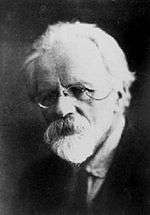Ilya Ivanovich Ivanov
| Ilya Ivanovich Ivanov | |
|---|---|
|
Ilya Ivanov, 1927 | |
| Born |
August 1 [O.S. July 20] 1870 Shchigry, Kursk gubernia, Russian Empire |
| Died | 20 March 1932 (aged 61) |
| Nationality | Russian |
| Fields | biology |
| Alma mater | University of Kharkiv |
| Known for | artificial insemination |
Ilya Ivanovich Ivanov (Russian: Илья́ Ива́нович Ивано́в, August 1 [O.S. July 20] 1870-March 20, 1932) was a Russian and Soviet biologist who specialized in the field of artificial insemination and the interspecific hybridization of animals. He was involved in controversial attempts to create a human-ape hybrid.
Biography
Ilya Ivanovich Ivanov was born in the town of Shchigry, Kursk gubernia, Russia. He graduated from the Kharkov University in 1896 and became a full professor in 1907. He worked as a researcher in the Askania-Nova natural reserve, also for the State Experimental Veterinary Institute (1917–1921, 1924–1930), for the Central Experimental Station for Researching Reproduction of Domestic Animals (1921–1924), and for the Moscow Higher Zootechnic Institute (1928–1930).
Around the start of the 20th century, Ilya Ivanov perfected artificial insemination and its practical usage for horse breeding. He proved that this technology allows one stallion to fertilize up to 500 mares (instead of 20–30 by natural fertilization). The results were sensational for their time, and Ivanov's station was frequented by horse breeders from many parts of the world.
Human-ape hybridization experiments
The most controversial of Ivanov's studies was his attempt to create a human-ape hybrid. As early as 1910, he had given a presentation to the World Congress of Zoologists in Graz in which he described the possibility of obtaining such a hybrid through artificial insemination.
In the 1920s, Ivanov carried out a series of experiments to create a human/nonhuman ape hybrid. Working with human sperm and female chimpanzees, he failed to create a pregnancy.[1] In 1929 he organized a set of experiments involving nonhuman ape sperm and human volunteers, but was delayed by the death of his last orangutan.[1]
Later
In the course of a general political shakeup in the Soviet scientific world, Ivanov and a number of scientists involved in primate research and experiments lost their positions. In the spring of 1930, Ivanov came under political criticism at his veterinary institute. Finally, on December 13, 1930, Ivanov was arrested. He was sentenced to five years of exile to Alma Ata, where he worked for the Kazakh Veterinary-Zoologist Institute until his death from a stroke on 20 March 1932. The renowned physiologist and psychologist Ivan Pavlov wrote an obituary for him.
Orango opera
His work was one of the sources of inspiration for the unfinished satirical opera, Orango whose Prologue was sketched in 1932 by Dmitri Shostakovich with a libretto by Aleksey Nikolayevich Tolstoy and Alexander Osipovich Starchakov but the whole was later abandoned and discarded. The manuscript was found by Olga Digonskaya, a Russian musicologist, in the Glinka Museum, Moscow in 2004 and orchestrated by Gerard McBurney; this work was premiered on 2 December 2011 in Los Angeles, California by the Los Angeles Philharmonic under Esa-Pekka Salonen (conductor) and staged by Peter Sellars (director).[2][3]
See also
References
- 1 2 http://www.newscientist.com/article/mg19926701.000-the-forgotten-scandal-of-the-soviet-apeman.html
- ↑ McBurney, Gerard (13 October 2010). "Some frequently-asked questions about Shostakovich’s 'Orango'". Tempo 64 (254): 38–40. doi:10.1017/S0040298210000409.
- ↑ Sergei L. Loiko and Reed Johnson (27 November 2011). "Shostakovich's 'Orango' found, finished, set for Disney Hall". Los Angeles Times. Retrieved 17 February 2012.
- Rossiianov K (June 2002). "Beyond species: Il'ya Ivanov and his experiments on cross-breeding humans and anthropoid apes". Science in Context 15 (2): 277–316. doi:10.1017/S0269889702000455. PMID 12467272.
- Zvereva GV (July 1970). "[Professor I.I. Ivanov--founder of artificial insemination of animals]". Veterinariia (in Russian) 7: 88–90. PMID 4253169.
- Smirnov LN, Ozhin FV (July 1970). "[Outstanding scientist-biologist (Il'ia Ivanovich Ivanov)]". Veterinariia (in Russian) 7: 90–2. PMID 4253171.
- Etkind A (June 2008). "Beyond eugenics: the forgotten scandal of hybridizing humans and apes". Studies in History and Philosophy of Biological and Biomedical Sciences 39 (2): 205–210. doi:10.1016/j.shpsc.2008.03.004. PMID 18534351.
Web references
- (Russian) Article in Zerkalo Nedeli
- (Russian) Article in Trud at the Wayback Machine (archived November 22, 2005)
- (Russian) Article in Moskovskiy Komsomomolets
- (Russian) Article in KoMok newspaper
- (Russian) article in Great Sovier Encyclopaedia - the article doesn't mention the alleged experiments
- (English) NYT op-ed piece reprinted by University of Florida
- (Russian) Зачем человеку кентавр? from Tonos.ru
External links
|
